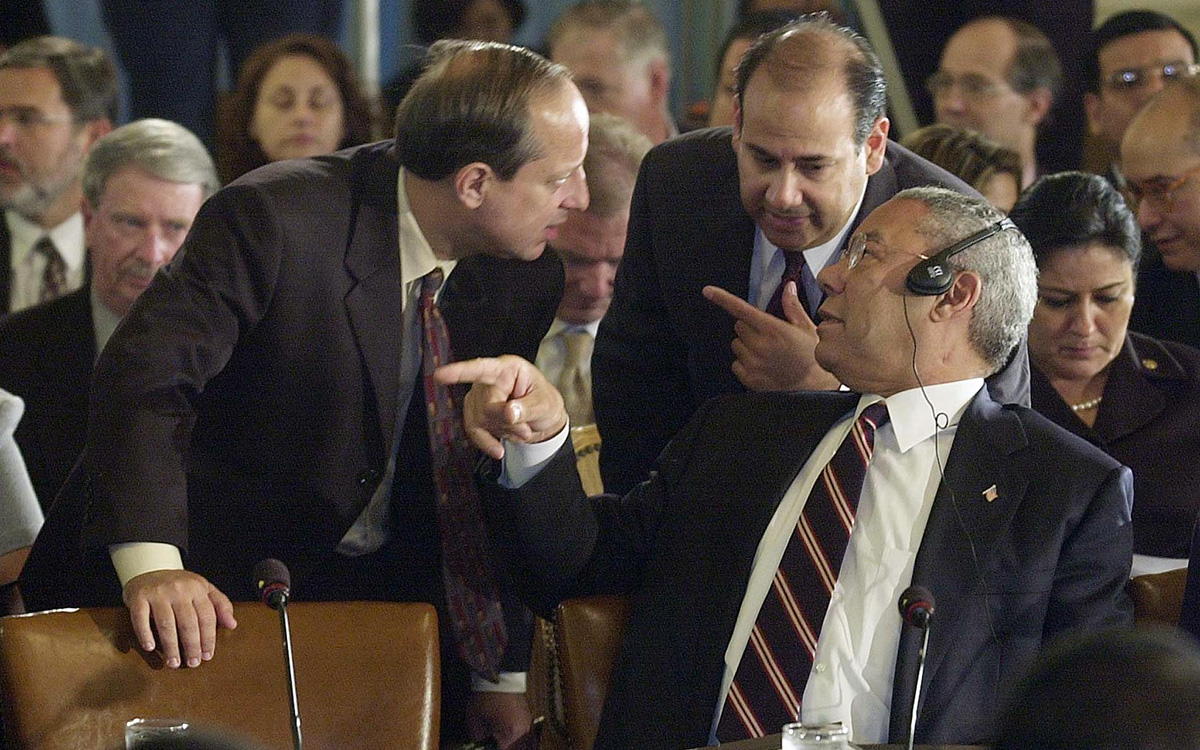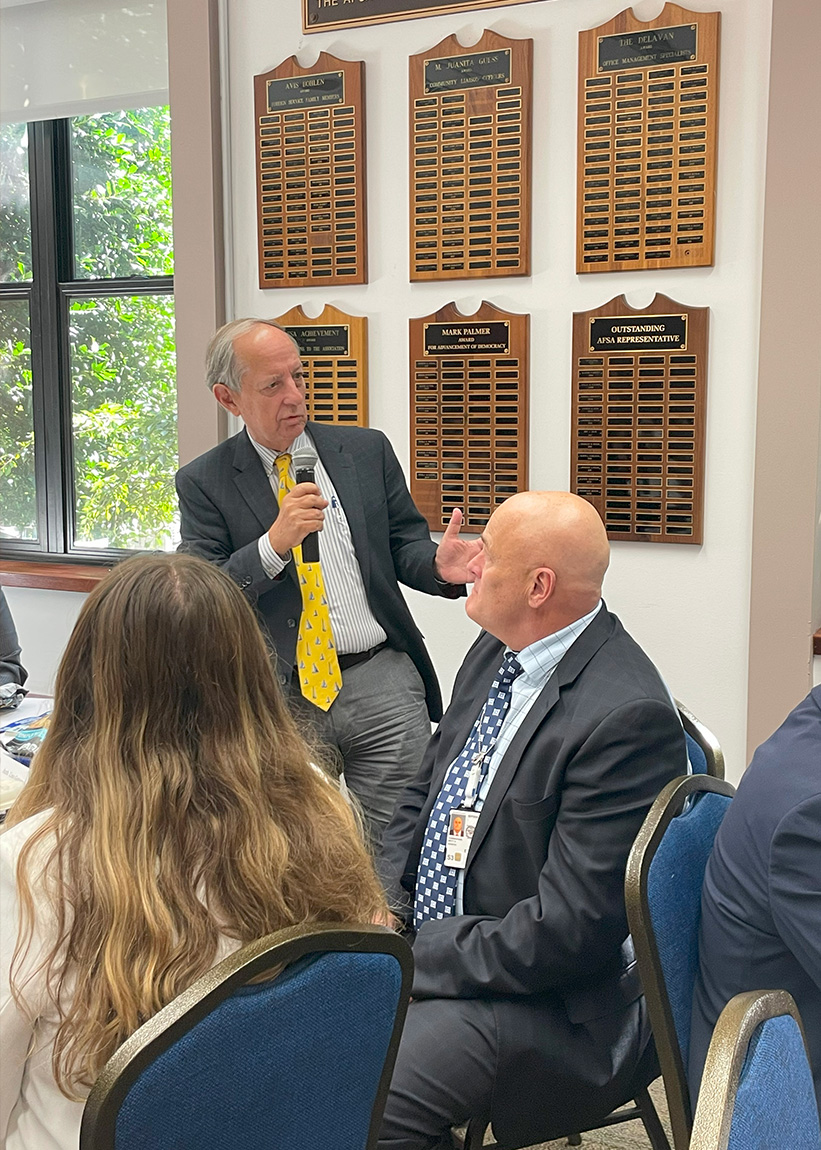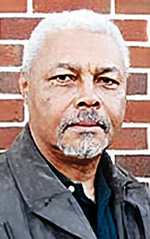Lino Gutiérrez, 1951-2025: An Unsung Hero of the Foreign Service
BY CHARLES RAY

In September 2001, Lino Gutiérrez (left), then acting assistant secretary of State for Western Hemisphere affairs, talks to Secretary of State Colin Powell and U.S. Ambassador to the Organization of American States (OAS) Roger Noriega prior to Powell’s speech before an emergency meeting of the OAS Office of American States in Washington, D.C., in the wake of the al-Qaida terror attacks on the United States.
Shawn Thew / AFP via Getty Images
On May 3, 2025, the Foreign Service lost an icon and one of its strongest supporters with the death of former Ambassador Lino Gutiérrez. Some of us also lost a best friend and mentor.
Lino Gutiérrez was born in Cuba on March 26, 1951. Ten years later, just after the ill-fated Bay of Pigs invasion, his family fled Cuba for Colombia, where they stayed for 14 months before coming to the United States.
When they arrived in the Deep South city of Tuscaloosa, Alabama, in 1962, the civil rights movement, which began in the mid-1950s, was starting to heat up. In a post-retirement interview with the Association for Diplomatic Studies and Training (ADST), Lino remarked that it felt strange to see water fountains marked “colored” and “white.” He recalled the contrast between the friendliness of Southerners and the segregation that marked society. The turbulence of Tuscaloosa, he said, was not completely dissimilar to the upheavals that Castro brought to post-Batista Cuba. Nevertheless, he and his family were happy to be out of Cuba.
Lino studied at the University of Miami and the University of Alabama. When the Gutiérrez family arrived in Alabama, the university was lily-white, but by his junior and senior years of high school, the educational institutions had begun to integrate. Lino experienced the civil rights struggle, the marches, the Freedom Riders, and the Birmingham church bombings but noted that by 1969, things had calmed down. Still, except on the newly integrated university football team, Black people pretty much kept to themselves.
After graduating in 1972, Lino took the Federal Service Entrance Exam. He scored high enough to be offered two jobs: one with the General Services Administration in Atlanta, Georgia, and another with the Internal Revenue Service in Mobile, Alabama. Neither of these jobs appealed to him, so he stayed in school a few extra months to obtain his teaching certificate. In May 1973, he headed to Miami to explore job opportunities as a teacher.
Upon arriving in Miami, he saw an advertisement for a new experimental school called the Street Academy, a federally funded school designed by the Urban League for dropouts and students who had been suspended; he applied and was offered a job as a social studies teacher.
Looking back, he described the job as both exhilarating and frustrating. It was, he recalled, a time when the government was putting a lot of money into social programs, but it was also a time of great alienation, especially in minority communities, with violence, including the assassination of Martin Luther King Jr., and the increasing presence of crime and drugs on the streets. After two years teaching, he was offered an assistantship in Latin American studies at the University of Alabama, where he earned his master’s degree. After two attempts, he passed the Foreign Service examination and joined the U.S. Foreign Service on Jan. 13, 1977.
His first Foreign Service assignments were in the Dominican Republic and Portugal. From 1981 to 1983, he served as the Nicaragua desk officer in the State Department, after which he was assigned to Port-au-Prince. From 1985 to 1993, he held various assignments, including Portugal desk officer at State and deputy chief of mission in Nassau, Bahamas. From 1993 to 1994, he attended the Senior Seminar, a prestigious training assignment during which senior civilian and military foreign affairs officers spend an academic year familiarizing themselves with the United States, particularly regions outside the Washington orbit.
From 1994 until his retirement in 2006, Lino served as director of the Office of Policy Planning, U.S. ambassador to Nicaragua (1996-1999), principal deputy assistant secretary for Western Hemisphere affairs, international affairs adviser and deputy commandant of the National War College, and U.S. ambassador to Argentina (2003-2006).
Because his assignments were in or related to Latin America and Europe, and I served in Asia and Africa after joining the Foreign Service in 1982, our paths didn’t cross until after we both retired—he in 2007 and I in 2012.
 §
§
In retirement, Ambassador Gutiérrez became the executive director of the Una Chapman Cox Foundation, which shared space with the American Academy of Diplomacy (AAD), where we were both members. In addition to running into each other at AAD meetings, I would occasionally drop into his office to chat about Cox Foundation activities.

On Oct. 11, 2023, Amb. Lino Gutiérrez addresses new State Department Foreign Service officers and specialists at AFSA HQ.
AFSA / Donna Gorman
I’d heard a lot about the foundation but didn’t really understand what it was. Lino took the time to educate me about an organization that was doing some important things to benefit the Foreign Service that few of us in the Service even knew about. He lit up when he talked about the work, and it was clear this was more than just a job to him—it was a calling.
In 2018 Lino recruited me as a Cox Foundation policy council member. I got to know him well and found that despite the differences in our origins and career paths, we had much in common—most of all our dedication to helping the U.S. Foreign Service live up to its fullest potential. We also shared a love of teaching and a desire to prepare the next generation of diplomatic leaders. He served as an adjunct professor at The George Washington University and Johns Hopkins University, where he mentored the next generation of public servants, instilling in them his love of country and dedication to service to others.
Lino was also a quiet advocate for diversity in the Foreign Service, working behind the scenes to support programs that increased representation of minorities and women and fighting the misperception of some colleagues who objected to affirmative action and programs because they wrongly assumed the minority candidates being helped were not qualified. After his 29-year career, he recognized that the State Department wasn’t doing a good job recruiting and promoting some minorities. Hispanics, for example, accounted for only 4 percent of Foreign Service officers (FSOs) in 1977. When he retired in 2006, despite a significant increase in the Hispanic population in the United States, they still made up just 4 percent of FSOs.
Lino was the quintessential “get the job done” kind of person and a good leader. The start of the COVID-19 pandemic coincided with the planned end of my tenure as chair of the policy council, but Lino asked me to serve an additional year and work with him to conduct our business in a hybrid (virtual/face-to-face) format. Neither of us had any experience doing this, but his sense of humor and determination helped us pull it off. During that turbulent year, the foundation’s activities continued without significant interruption in large part thanks to Lino. He never let anything keep him from getting the job done, and he had a way of enlisting others in his crusade and inspiring them to do things they never thought themselves capable of doing.
During his time as executive director of the Cox Foundation, Lino made significant contributions to advancing the cause of diversity in the Foreign Service and enhancing the State Department’s role as America’s premier foreign affairs agency. He was, for instance, instrumental in getting Cox’s financial support for the American Diplomacy Project, the brainchild of retired Ambassadors Nicholas Burns, Marc Grossman, and Marcie Ries. Initially housed in the Belfer Center at Harvard’s Kennedy School, the follow-on project was supported by Arizona State University when Burns left Harvard to accept a position in the second Obama administration. Thanks to Lino’s recommendation, I was chosen to be the project’s executive director.
 §
§
I will never forget Lino’s wry wit and ability to see the lighter side of things, even when times were dark, and I’m sure that everyone who knew him feels the same way.
Lino Gutiérrez was one of those people who never needed public adulation for his work. He did what needed to be done because it was required and it was the right thing to do. His legacy will endure in the lives of those whom he quietly influenced.
He was like a candle in a dark room, a gentle light that doesn’t overwhelm, whose power and impact are only truly appreciated when extinguished.
When sharing or linking to FSJ articles online, which we welcome and encourage, please be sure to cite the magazine (The Foreign Service Journal) and the month and year of publication. Please check the permissions page for further details.



